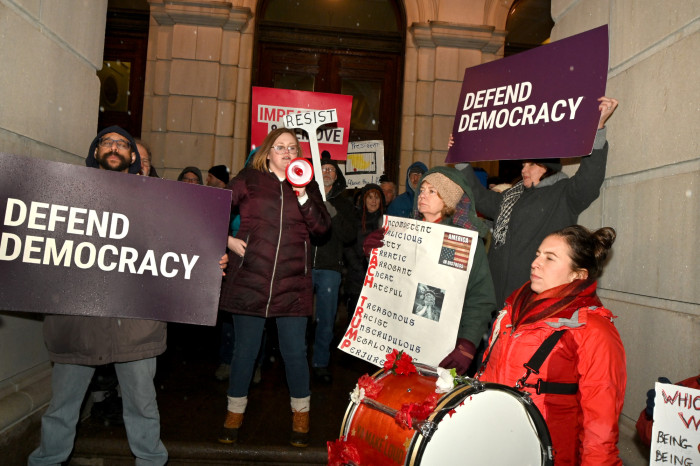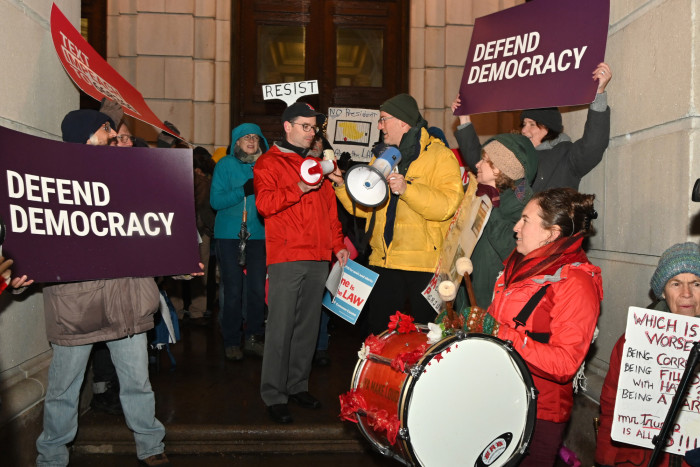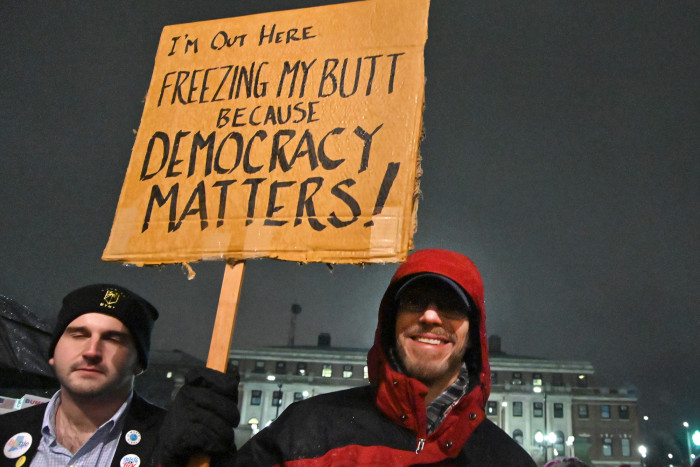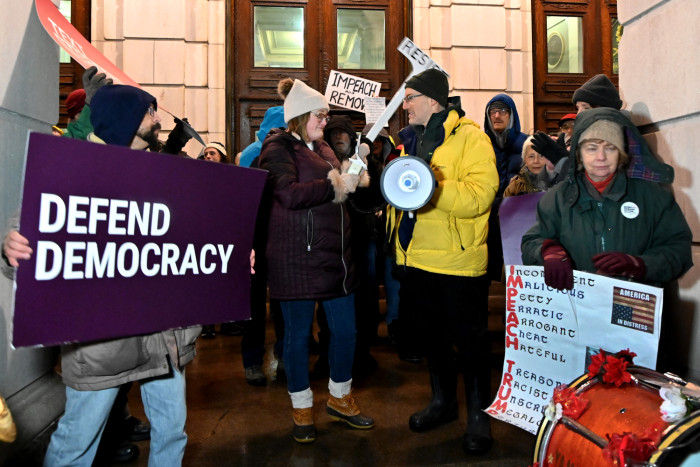Impeachment Is an Ultimate Test in a Democracy - MINDSETTER™ Schoos
Tuesday, January 21, 2020
On February 4, 1974, the House of Representatives empowered the House Judiciary Committee to investigate possible impeachable offenses that may have been committed by Richard Nixon. Between July 27 – 30, 1974, the Judiciary Committee reported three Articles of Impeachment, one for obstruction of justice, another for abuse of power, and the third for contempt of Congress. On August 9, knowing that he would lose any trial in the Senate, Nixon resigned.
On December 19, 1998, the House of Representatives voted to adopt two Articles of Impeachment, one for committing perjury in a grand jury proceeding and the other for obstruction of justice. The Senate conducted a trial that commenced on January 7, 1999. By February 12, the Senate voted “not guilty” by a vote of 55-45 on the perjury charge and voted a 50-50 tie on the obstruction charge. Both votes failed to attain the 2/3 majority required and Clinton served out the remainder of his term of office.
And now Trump. Let’s be clear, there is evidence to support the argument that Trump and his minions did something improper. Actually, they did quite a bit of somethings, all designed to serve Trump’s political interests at the expense of this country’s and Ukraine’s security interests.
GET THE LATEST BREAKING NEWS HERE -- SIGN UP FOR GOLOCAL FREE DAILY EBLASTThis assertion is beyond contestation. So incontestable is the case against Trump that House and Senate Republicans do not contest it. Trump has prevented the “fair hearing” that he and his allies clamored for by failing to produce subpoenaed documents and by blocking “fact witnesses” serving in his administration from testifying. Sure, we hear assertions of “hoax,” “witch hunt,” “lack of due process,” and the most bogus of all, lack of fairness. Mind you, these are the defenses of the President of the United States and his allies, not those of a six-year-old kid accused of pilfering cookies.
My favorite non-defense is the absence of a violation of even one statute. Recall that I have written in the past that it isn’t necessary to violate a current statute in order to be charged and convicted of “high crime and misdemeanor.” As the president’s defenders repeatedly assert this defense, allow me to rebut: if, as the evidence shows, he committed the acts as recorded in both Articles of Impeachment, he at minimum violated the Impoundment Control Act of 1974. Even the General Accounting Office agrees with me.
Dershowitz Factor
One of the President’s recently appointed attorneys, Alan Dershowitz, has stated that there is no high crime or misdemeanor in either Article of Impeachment because the charges alleged do not relate to Treason or Bribery. Evidently, he places great store in the power of the word “other” in the clause “treason, bribery, and other high crimes and misdemeanors.” In order to support the claim that any impeachable charges have to be an outgrowth of the elements of either treason or bribery, or both, Dershowitz needs to actually torture the meaning and context of the word “other” in order to avoid the clear historical record.
From the reading of the Notes taken during the Philadelphia convention, the framers’ understanding of the inherited English common law, and the Federalists Papers, it is clear that the convention used “other high crimes and misdemeanors” as a kind of catch-all for offenses against the public committed by the President and other members of the executive branch. And as made clear by the historical record, “abuse of office” was one such offense covered by the broad-based term.
However, even if Dershowitz is correct, he still has a problem with the offense of “bribery.” Under English Common Law accepted by the colonies and subsequently, by the newly formed states, bribery was not only the acceptance of a gratuity in return for an official act. It also included the act of a government official offering something of value to a third party in exchange for that party performing some act. Under this history, the asserted withholding of aid to Ukraine until the Ukrainian government unless they performed a specific act seems to fall within the parameters of this argument.
The point here is that we’ll hear a lot of seemingly serious Constitutional assertions and analysis, and some might even be accurate. Others will be novel, with still others bordering on fantasy. But it should be entertaining.
On January 21, the Impeachment Trial of President Donald John Trump will begin in the Senate. Whether one hangs on every utterance or ignores the process altogether, there is much at stake. For Trump, it’s obvious. If he’s convicted of high crimes and misdemeanors, the only punishment available is removal from office. There is no alternative.
For the members of Congress, individually and collectively, how this process is conducted will be etched in our national history for all time. It’s no secret that our social and political norms have been strained, not only over the past three years, but for the past three decades. How this impeachment process unfolds, how the Senate establishes the rules of engagement, how the House members prosecute the case, what witnesses are called, if any, will all combine to divide us further or begin the process of healing the divisions that not many like. I know I don’t.
Witnesses?
On the subject of “process,” as of this writing, there is a dispute over whether either side will be permitted to call witnesses to testify and what documents will be admitted as relevant. The House managers (aka prosecutors) want to call witnesses, the Senate leadership doesn’t, and Trump and his team have sent mixed signals on this issue. Generally, the issue focuses on this: If the House is able to call witnesses, then the defense ought to be able to call Hunter Biden, the (unnamed) Whistleblower, and …. who cares? If the Trump team thinks that Daffy Duck and Bugs Bunny are relevant to their cause, they should call them. The House prosecutors can call John Bolton, Mick Mulvaney, Secretary Pompeo, and maybe Lev Parnas if they think these witnesses are relevant to their case. The bottom line is that the Senate’s rules should provide for witnesses so that there is a transparent vetting of the charges. It is only through an actual trial that the issues can be joined, fleshed out, facts determined, and judgments made upon the revealed facts. And only then can the public be confident that any outcome is fairly derived.
This is also an overall test of our governing institutions. Since the 1930s, government has gone from a savior and champion of the people, to an annoying irrelevancy, and now to an enemy. Broadly speaking, none of these characterizations is accurate. The government is not a standalone organic entity, capable of independent acts. Government is comprised of good people doing their best under the terms and conditions of their responsibilities. Ideally, governments are political creatures, comprised of and influenced by the governed. Without getting into the weeds of Enlightenment philosophy, in a very real sense, we created the government that we seem to criticize so much. Put simply, we are the government, and if we don’t like how it behaves, we need only look in a mirror to discover the cause. Congress is a governing institution that is responsive to our direct inputs, not those at an arena rally or a television network.
An impeachment is an ultimate test in a democracy. Within a month we’ll have the outcome. Our test is how we respond to the results. My concern about the process and conduct of the impeachment trial is transparency. Only with transparency will the majority of people, while perhaps not liking the outcome, be able to accept it.
Those Trump supporters who revere #45 will no doubt be angered. Those anti/never Trump opponents will be disconsolate should he not be convicted and removed. But even Judge Judy teaches us that in any litigation, there is a winner and a loser. And so it will be here.
I won’t hide the pea here.I believe this president did commit impeachable offenses for which he should be convicted and removed from office. If the case goes against me, I’ll be upset. If I “win” I still get Vice-President Pence for at least one more year, so I’m unsure if this is really a “win.”
But just like those Trump supporters who’ll be upset if I “win,” I’ll need to accept the result of a fair process. In the last analysis, it isn’t who wins or loses that counts, it’s the vindication of our democratic institutions and our Constitution that’s at stake. And if we fail this test, we’ve lost more than a comparatively minor political battle.
Geoffrey A. Schoos, Esquire is the past President of the former Rhode Island Center for Law and Public Policy.
Related Slideshow: Trump Impeachment Rally in Providence - December 17, 2019
Related Articles
- Trump Should Apologize for Comparing Impeachment to Lynching: NAACP’s Vincent LIVE
- Potential Potholes & Pitfalls of Impeachment – “The Sunday Political Brunch” - October 13, 2019
- The Launching of Impeachment 1, 2, 3 – “Sunday Political Brunch” - November 3, 2019
- Horowitz: Senate Republicans Calibrate on Impeachment
- Impeachment Hearings Begin — Here Are Five RI Watergate Impeachment Connections
- Top RI GOP Leader Calls for Trump’s Impeachment and Removal
- Horowitz: Trump’s Actions on Ukraine Earn Him an Impeachment Inquiry
- VIDEO: Cicilline Refuses to Call for Impeachment, Warren and Ocasio-Cortez Urge Proceedings
- The Long & Winding Road to Impeachment – Sunday Political Brunch June 2, 2019
- House Speaker Pelosi to Support Formal Impeachment Inquiry of Trump
- Lessons from Impeachments Past – “Sunday Political Brunch”—September 29, 2019
- WATCH LIVE: Impeachment Hearing of President Donald Trump by the House Committee on Intelligence
- An Impeachment Flashback That May Haunt 2020 – “Sunday Political Brunch” November 17, 2019
- PHOTOS: Trump Impeachment Rally in Providence
- The Political Strategies of Impeachment – “Sunday Political Brunch” - December 15, 2019
- WATCH LIVE: House Impeachment Vote
- “Damn the Torpedoes, Full Speed Ahead” on Impeachment, Election – Sunday Political Brunch Dec. 22
- Sen. Reed LIVE on Impeachment and Big Issues in 2020 Presidential Race
- NEW: House Judiciary Committee Approves Articles of Impeachment Against Trump
- House Democrats Unveil 2 Articles of Impeachment Against Trump
- Rickman’s Big View - Impeachment Inquiry
- House Judiciary Impeachment Hearing Scheduled - What to Expect Next Week: UVA’s Lawless LIVE
- Democrats Release Trump Impeachment Report - Read the Executive Summary HERE
- Horowitz: Impeachment - The Current State of Public Opinion
- Impeachment Is an Ultimate Test in a Democracy - MINDSETTER™ Schoos



























































